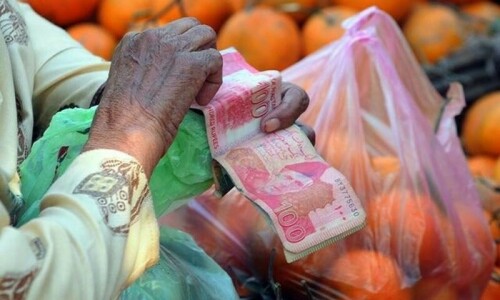
SUSTAINABLE growth of the food processing industry and its alignment with value-addition chain of global food markets are required to give a boost to small and medium enterprises (SMEs) in the food sector.
Adopting better and more dependable approaches in manufacturing and marketing of food products is also a must to make food industries responsive to changing local and export market dynamics.
SMEs in Pakistan are classified into three categories, i.e. manufacturing, services and trade. Food SMEs fall in all three categories.
The enterprises in agricultural and food processing, dairy and livestock, and food and beverages are in the manufacturing category; hotels and restaurants are in services; whereas wholesalers and retailers of food items are in the trade category.
Therefore, it is difficult to keep track of food SMEs and no credible data regarding them is available. But since the food and beverages sub-sector carries 12.4 per cent weight in large-scale manufacturing (LSM) — the second highest after textiles with 21pc — the importance of food sector SMEs can be well understood.
The bulk of all food business in Pakistan is carried out through hundreds of thousands of SMEs, including those that come in the supply and value-addition chain of food industries in LSM.
A large number of rice and maize processing and wheat milling units are in the SME sector. The same is true for cooking oil and spices manufacturing industries. And it goes without saying that thousands of bakeries, hotels, motels, restaurants and eateries are all but SMEs.
Many food sector SMEs are also direct exporters and many more are in the supply chain of leading food export houses. Without revamping and revitalising food sector SMEs, we cannot think of rebuilding our food economy. But the question is how?
Though some healthy developments are taking place, a lot more needs to be done.
Chinese investment in the agriculture sector should be sought on a priority basis. As part of the China-Pakistan Economic Corridor (CPEC), Beijing is keen on investing in our agriculture sector as well.
Officials say Pakistan is seeking Chinese investment also for the capacity-building of SMEs in the agriculture sector.
Officials of the Small and Medium Enterprises Development Authority (Smeda) say there is also enough scope for joint ventures between Pakistani and Chinese SMEs in logistics, trucking, warehousing (that can promote food sector SMEs), fisheries, horticulture, food processing, dairy and livestock, cold storage and supply chain business, etc.
After a recent visit of a Chinese business delegation to Lahore and their subsequent meetings with Pakistani officials and businessmen, chances for early interaction for developing the SME sector have brightened.
Our markets remain flooded with Indian food products throughout the year (except when political tension heightens between the two neighbours). This is proof that in addition to growing imports of food items from across the border, food products of India are also freely smuggled into our markets. Therefore, the smuggling of food items from India or from Iran and other countries has to stop if our food-sector SMEs are to flourish.
Moreover, Pakistan’s ranking in the World Bank’s ease of doing business indicator dropped from 77th in 2007 to 141st in 2017. This is discouraging for local and foreign investors. Unless we score better on this indicator, organising or reshaping food-sector SMEs in particular and fast-moving consumer good companies in general, or attracting foreign investment into them is just too difficult.
A major reason for our low score in the ease of doing business is that businessmen have to deal with numerous federal and provincial agencies. Tackling this issue honestly and efficiently can help boost the SME sector.
Furthermore, the cost of doing business in Pakistan still remains high due to net effective rates of power tariff, shortage of water, broken chain of value addition and supply chains, poor logistics, high incidence of total applicable taxes and corruption.
Higher taxation and the requirement to deal with multiple agencies have led to a phenomenal growth of SMEs in the informal sector. As for SMEs manufacturing food, prices of raw materials (especially food grains, fruits, veggies, chicken, etc) often show unusual volatility which makes cost projections quite difficult.
In case of red meat, seafood and spices and other raw materials, guaranteeing uninterrupted supply of high-standard, hygienic stuff remains an issue.
Provincial governments are working on plans to improve grain storage and to cut pre- and post-harvest losses besides improving farm-to-market road infrastructure. This may keep prices of perishables from going too volatile at times.
Lastly, food companies, large or small, now need to get innovative and invest in capacity-building and modernisation.
Published in Dawn, The Business and Finance Weekly, October 16th, 2017















































Dear visitor, the comments section is undergoing an overhaul and will return soon.